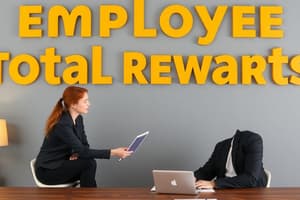Podcast
Questions and Answers
What is the primary purpose of severance pay?
What is the primary purpose of severance pay?
- To prevent litigation from former employees (correct)
- To supplement wages during vacation
- To provide financial support in retirement
- To increase performance-related compensation
Which benefit is directly linked to an employee being temporarily unable to work due to illness?
Which benefit is directly linked to an employee being temporarily unable to work due to illness?
- Pension plans
- Sick leave (correct)
- Workers’ compensation
- Severance pay
How does case management help employers in relation to workers' compensation claims?
How does case management help employers in relation to workers' compensation claims?
- It increases benefits for accidents
- It reduces the cost associated with claims (correct)
- It provides legal representation for employees
- It standardizes severance pay packages
Which of the following is an example of a supplemental pay benefit?
Which of the following is an example of a supplemental pay benefit?
What does flextime allow employees to do?
What does flextime allow employees to do?
What is a key characteristic of a compressed workweek?
What is a key characteristic of a compressed workweek?
What is meant by 'performance/variable pay'?
What is meant by 'performance/variable pay'?
What is 'work sharing' primarily used for?
What is 'work sharing' primarily used for?
Flashcards are hidden until you start studying
Study Notes
Benefits Overview
- Benefits are indirect financial and non-financial compensation for employee retention.
- Supplemental pay benefits include unemployment insurance, vacation pay, holiday pay, and sick pay for time not worked.
Specific Benefit Types
- Sick leave provides compensation during temporary illness-related absences from work.
- Severance pay serves as a humanitarian gesture and may diminish potential lawsuits from former employees.
Employer Responsibilities
- Employers fund workers’ compensation benefits, which cover income and medical expenses for work-related injuries.
- Workers’ compensation ensures protection for employees affected by workplace accidents or their dependents.
Cost Management
- Case management strategies help employers reduce expenses associated with workers’ compensation claims.
Pension and Work Flexibility
- Pension plans offer income support to individuals after retirement.
- Flextime permits employees to customize their work schedule around core midday hours.
- Compressed workweek allows employees to work less frequently but for longer hours each day.
- Job sharing enables multiple individuals to collectively fulfill one full-time position.
- Work sharing involves temporary reductions in employee hours to avert layoffs during economic challenges.
Reward System Components
- Direct base pay refers to a fixed salary or wage provided to employees.
- Pay progression may depend on factors like age, service length, or performance metrics.
- Performance or variable pay connects compensation directly to individual work performance or achievements.
Studying That Suits You
Use AI to generate personalized quizzes and flashcards to suit your learning preferences.




